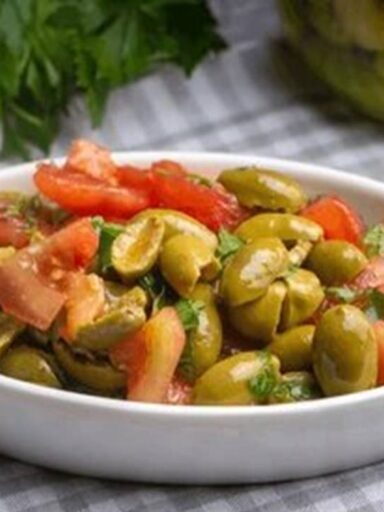Kisir Turkish Bulgur Salad
Kisir, a popular Turkish bulgur salad, is typically served as a side dish or appetizer rather than a main meal. It is made with fine bulgur, tomatoes, green onions, parsley, and a variety of seasonings like pomegranate molasses, lemon juice, and olive oil, creating a flavourful and light dish.
A Nutritious and Filling Dish
While Kisir is nutritious and filling, it’s generally considered a part of a larger meal, often accompanied by other mezes (small dishes) or served alongside grilled meats or vegetables. However, it can be enjoyed as a light main meal, especially for lunch or a light dinner, if paired with a protein source like chicken, eggs, or beans.
Serving
Served at Room Temperature: Kisir is typically served at room temperature, often accompanied by lettuce leaves, which can be used to scoop up the salad. It’s a versatile dish that can be enjoyed on its own or as part of a larger mezze spread. The result is a tangy, slightly spicy, and herbaceous salad that is both satisfying and light.

Packed With Flavours, Textures and Nutrients
Kisir is a traditional Turkish bulgur salad that’s packed with flavours, textures, and nutrients. It’s a versatile dish that can be served as a light meal, a side dish, or even a snack. The salad is made with fine bulgur, fresh herbs, vegetables, and a tangy dressing. Here’s a detailed recipe to make Kisir at home.
How to prepare Kisir Burgur Salad
Ingredients:
1 cup fine bulgur wheat
1 1/4 cups boiling water
1 medium onion, finely chopped
2-3 tablespoons olive oil
1 tablespoon tomato paste
1 tablespoon pepper paste (optional for extra heat)
1 teaspoon ground cumin
1 teaspoon red pepper flakes (adjust to taste)
1 medium cucumber, finely chopped
2-3 spring onions, finely chopped
1 medium tomato, finely chopped
1 small bunch of parsley, finely chopped
1 small bunch of fresh mint, finely chopped
1 lemon, juiced
2-3 tablespoons pomegranate molasses (optional but highly recommended)
Salt and pepper to taste
For Garnishing:
Romaine lettuce leaves (optional)
Pomegranate seeds (optional)
Instructions:
Prepare the Bulgur: Start by placing the fine bulgur in a large mixing bowl. Pour the boiling water over the bulgur, stir quickly, and cover the bowl with a lid or a plate. Let it sit for about 10-15 minutes until the bulgur absorbs the water and softens.
Once the bulgur is tender, fluff it up with a fork to separate the grains.
Cook the Onion and Paste:
In a small pan, heat the olive oil over medium heat. Add the finely chopped onion and sauté until it becomes translucent and soft, about 5-7 minutes.
Add the tomato paste and, if using, the pepper paste. Cook the mixture for another 2-3 minutes, allowing the flavours to meld together.
Stir in the ground cumin and red pepper flakes, and then remove from heat.
Combine the Ingredients:
Add the cooked onion mixture to the bulgur, stirring well to ensure the bulgur absorbs all the flavours.
Next, mix in the finely chopped cucumber, spring onions, tomato, parsley, and mint. Make sure all the ingredients are evenly distributed.
Season the Salad:
Squeeze the juice of one lemon over the salad. If using pomegranate molasses, drizzle it over the mixture. The pomegranate molasses adds a rich, tangy sweetness that complements the other flavours beautifully.
Season with salt and pepper to taste. Adjust the lemon juice and pomegranate molasses based on your preference for tanginess.
Rest and Serve:
Let the salad rest for about 15-20 minutes before serving, allowing the flavours to meld together.
Kisir is traditionally served at room temperature. You can serve it as is, or on a bed of romaine lettuce leaves for added texture and presentation.
Garnish and Enjoy:
For a festive touch, sprinkle some pomegranate seeds on top of the salad before serving. This not only adds colour but also enhances the sweet and tart notes of the dish.
Tips and Variations:
Pepper Paste: If you prefer a milder version, you can skip the pepper paste and stick to tomato paste.
Grains: The salad can be adjusted to have a grainier texture by adding more bulgur or reducing the amount of water.
Accompaniments: Kisir pairs wonderfully with grilled meats or as part of a mezze platter alongside other Turkish appetizers like hummus and baba ghanoush.
Vegan Friendly: This recipe is naturally vegan, making it a great option for those following plant-based diets.
Kisir is a refreshing and flavourful salad that brings a taste of Turkish cuisine to your table. Enjoy this vibrant dish with your family and friends!
Recommended Wine for Kisir
Kisir, with its bright flavours of fresh herbs, tomato, pomegranate molasses, and lemon, pairs wonderfully with wines that can complement its tangy, earthy, and slightly spicy profile. Here are some wine recommendations that work well with Kisir:
Rosé
Why it works: A dry, crisp rosé is a fantastic match for the acidity and herbs in Kisir. The lightness of rosé complements the salad’s freshness without overpowering it.
Region suggestions: Try a Provence Rosé from France or a Turkish rosé from the

White Wine – Albariño
Why it works: Albariño is a Spanish white wine with fresh acidity, citrus, and stone fruit notes. It complements the tartness of the pomegranate molasses and the herbaceous elements in Kisir.
Region suggestions: Go for an Albariño from Rías Baixas in Spain for a classic match.

Light Red – Pinot Noir
Why it works: For a red option, a light-bodied Pinot Noir is ideal. Its bright red fruit notes won’t overpower Kisir’s flavours, and it has just enough acidity to match the dish’s tanginess.
Region suggestions: Consider a Pinot Noir from Oregon in the U.S., or a Bourgogne Rouge from Burgundy, France.

White Wine – Grüner Veltliner
Why it works: Grüner Veltliner, an Austrian wine, has peppery and green apple notes that pair well with the parsley and mint in Kisir. Its high acidity and freshness make it a great match for the salad’s citrusy flavours.

Region suggestions: Austrian Grüner Veltliner, especially from the Wachau or Kamptal regions.
Riesling (Dry)
Why it works: A dry Riesling has bright acidity and citrus flavours that enhance the tanginess of Kisir. If you enjoy a hint of sweetness, a semi-dry Riesling can also pair nicely, balancing the spice in the dish.
Region suggestions: Look for a German

Riesling from the Mosel or Rheingau regions, or a dry Riesling from Alsace, France.
Each of these wines can enhance the flavours of Kisir, creating a balanced pairing that highlights the salad’s fresh, zesty profile. Enjoy!



